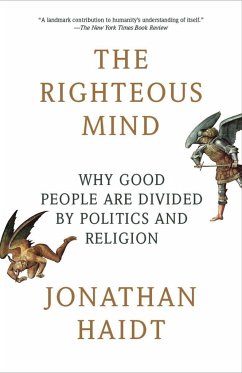Why can't political leaders work together as threats loom and problems mount? Why do people so readily assume the worst about the motives of their fellow citizens? Social psychologist Haidt explores the origins of divisions and points the way forward to mutual understanding.
Social psychologist Jonathan Haidt challenges conventional thinking about morality, politics, and religion in a way that speaks to conservatives and liberals alike in this New York Times bestselling "landmark contribution to humanity's understanding of itself" (The New York Times Book Review). Drawing on his twenty five years of groundbreaking research on moral psychology, Haidt shows how moral judgments arise not from reason but from gut feelings. He shows why liberals, conservatives, and libertarians have such different intuitions about right and wrong, and he shows why each side is actually right about many of its central concerns. In this subtle yet accessible book, Haidt gives you the key to understanding the miracle of human cooperation, as well as the curse of our eternal divisions and conflicts. If you're ready to trade in anger for understanding, read The Righteous Mind.
Hinweis: Dieser Artikel kann nur an eine deutsche Lieferadresse ausgeliefert werden.
Social psychologist Jonathan Haidt challenges conventional thinking about morality, politics, and religion in a way that speaks to conservatives and liberals alike in this New York Times bestselling "landmark contribution to humanity's understanding of itself" (The New York Times Book Review). Drawing on his twenty five years of groundbreaking research on moral psychology, Haidt shows how moral judgments arise not from reason but from gut feelings. He shows why liberals, conservatives, and libertarians have such different intuitions about right and wrong, and he shows why each side is actually right about many of its central concerns. In this subtle yet accessible book, Haidt gives you the key to understanding the miracle of human cooperation, as well as the curse of our eternal divisions and conflicts. If you're ready to trade in anger for understanding, read The Righteous Mind.
Hinweis: Dieser Artikel kann nur an eine deutsche Lieferadresse ausgeliefert werden.

